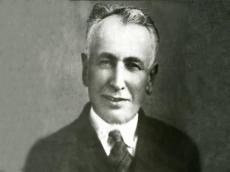|
|
TODAY.AZ / Arts & Entertainment
Azerbaijan to mark 150 anniversary of renowned publicist
03 October 2022 [17:20] - TODAY.AZ

By Azernews
By Laman Ismayilova
In December, Azerbaijan will celebrate the birthday anniversary of Omar Faig Nemanzada (1872-1937), well-known publicist and journalist, co-founder of Molla Nasraddin magazine, Azernews reports.
Azerbaijani President Ilham Aliyev signed a decree on celebrating the prominent representative of the national press, who would have turned 150 this year.
The Culture Ministry and the National Academy of Sciences are instructed to prepare and implement an event plan for the 150th anniversary of the publicist.
The Cabinet of Ministers is entrusted to resolve the issues arising from the order.
Omar Faig Nemanzada played an exceptional role in the history of the Azerbaijani press at the beginning of the 20th century.
The foundation of Qeyrat Press and Molla Nasraddin magazine cannot be imagined without his invaluable work.
In 1906, Nemanzada decided to publish his own publication, a grotesque magazine of caricatures with sharp satires. However, he could have the magazine registered himself due to his problems with the authorities.
So, he invited his friend Jalil Mammadguluzada to work as editor-in-chief of Molla Nasraddin magazine, while two Tbilisi Germans Schmerling and Rotter became its illustrators.
Omar Faig and Mammadguluzada devised plots for the caricatures that touched on issues, such as illiteracy, the situation of women, etc.
Soon the weekly magazine began to be published in 5,000 copies and spread throughout the Turkic world.
A selfless writer, who considered love for his mother tongue as the most important condition of love for his country, fought with determination for the sake of the cultural revival, independent and happy future of his native people without sparing his knowledge and skills.
The coverage of all fateful issues of national importance formed the main core of Omar Faig Nemanzada's journalistic legacy, rich in national ideas with deep political and social content.
Like many patriotic personalities of the time, he was one of the victims of the repression of the totalitarian Soviet regime in the 1930s.
URL: http://www.today.az/news/entertainment/226333.html
 Print version
Print version
Connect with us. Get latest news and updates.
See Also
- 26 December 2025 [18:47]
Azerbaijani Senior Wrestling Championship dates officially confirmed - 26 December 2025 [14:35]
Uzeyir Hajibayli’s life and works revisited in new publications - 26 December 2025 [12:21]
Master classes on accordion and mugham singing held in Yevlakh - 25 December 2025 [15:16]
Sumgait State Drama Theatre stuns audience with powerful play performance - 25 December 2025 [13:53]
Ramil Gasimov to perform role of Cavaradossi for first time - 25 December 2025 [12:18]
Festive concert by Fidan Hajiyeva Vocal Music School held in Baku - 25 December 2025 [11:02]
'Swan Lake' ballet staged in Baku with participation of leading soloists from France and Belarus - 25 December 2025 [00:09]
Leyla Aliyeva, Arzu Aliyeva, and Alena Aliyeva visit Special Boarding General Education School No. 5 in Baku - 24 December 2025 [14:35]
Icherisheher State Reserve reviews year-end results in cultural heritage protection - 24 December 2025 [12:00]
Int'l Mugham Center pays tribute to outstanding mugham singer
Most Popular
 UN report debunks Taliban claims on terrorism, highlights persistent threats from Afghan soil
UN report debunks Taliban claims on terrorism, highlights persistent threats from Afghan soil
 ASCO’s “Koro?lu” tanker completes shipyard overhaul
ASCO’s “Koro?lu” tanker completes shipyard overhaul
 Vision and achievements of President Ilham Aliyev - strategic leader shaping modern Azerbaijan
Vision and achievements of President Ilham Aliyev - strategic leader shaping modern Azerbaijan
 Serbian President makes phone call to President Ilham Aliyev
Serbian President makes phone call to President Ilham Aliyev
 China opens robotics school for humanoid training
China opens robotics school for humanoid training
 Digital Safety Conference delegates tour “My Seas, My Oceans” exhibition
Digital Safety Conference delegates tour “My Seas, My Oceans” exhibition
 Icherisheher State Reserve reviews year-end results in cultural heritage protection
Icherisheher State Reserve reviews year-end results in cultural heritage protection
